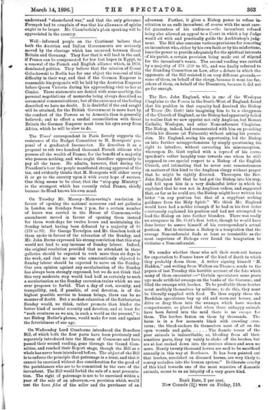On Tuesday Mr. Massey - Main waring's resolution in favour
of opening the national museums and art galleries in London on Sundays from 2 p.m. for a certain number .of hours was carried in the House of Commons,—the amendment moved in favour of opening them instead -for three week-days for twelve hours and maintaining the Sunday intact having been defeated by a majority of 85 (178 to 93). Sir George Trevelyan and Mr. Goschen both of them spoke in favour of the relaxation of the Sunday, and Mr. John Burns expressed his strong conviction that this step would not lead to any increase of Sunday labour. Indeed, the original resolution provided that no attendant in these galleries should be expected to work more than six days in the week, and that no one who conscientiously objected to Sunday labour should be expected to serve on the Sunday. Our own opinion against any secularisation of the Sunday has always been strongly expressed, but we do not think that this very moderate step would lead half as certainly to such a secularisation as the Sunday excursion-trains which no one ever proposes to forbid. That a day of rest, serenity, and tranquillity, and, if possible, of real devotion, is of the highest possible service to human beings, there can be no manner of doubt. But a modest relaxation of the Sabbatarian Sunday would, we think, rather promote than hinder the better kind of mental serenity and devotion, and at least for "such creatures as we are, in each a world SS the present," to use Bishop Butler's phrase, would make for rest and against the feverishness of our age.






































 Previous page
Previous page